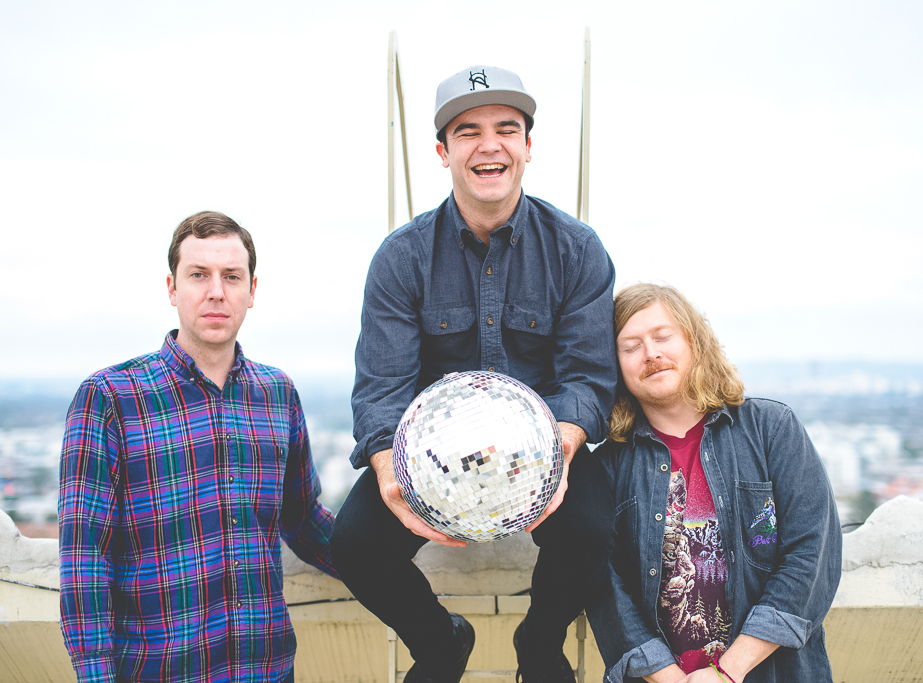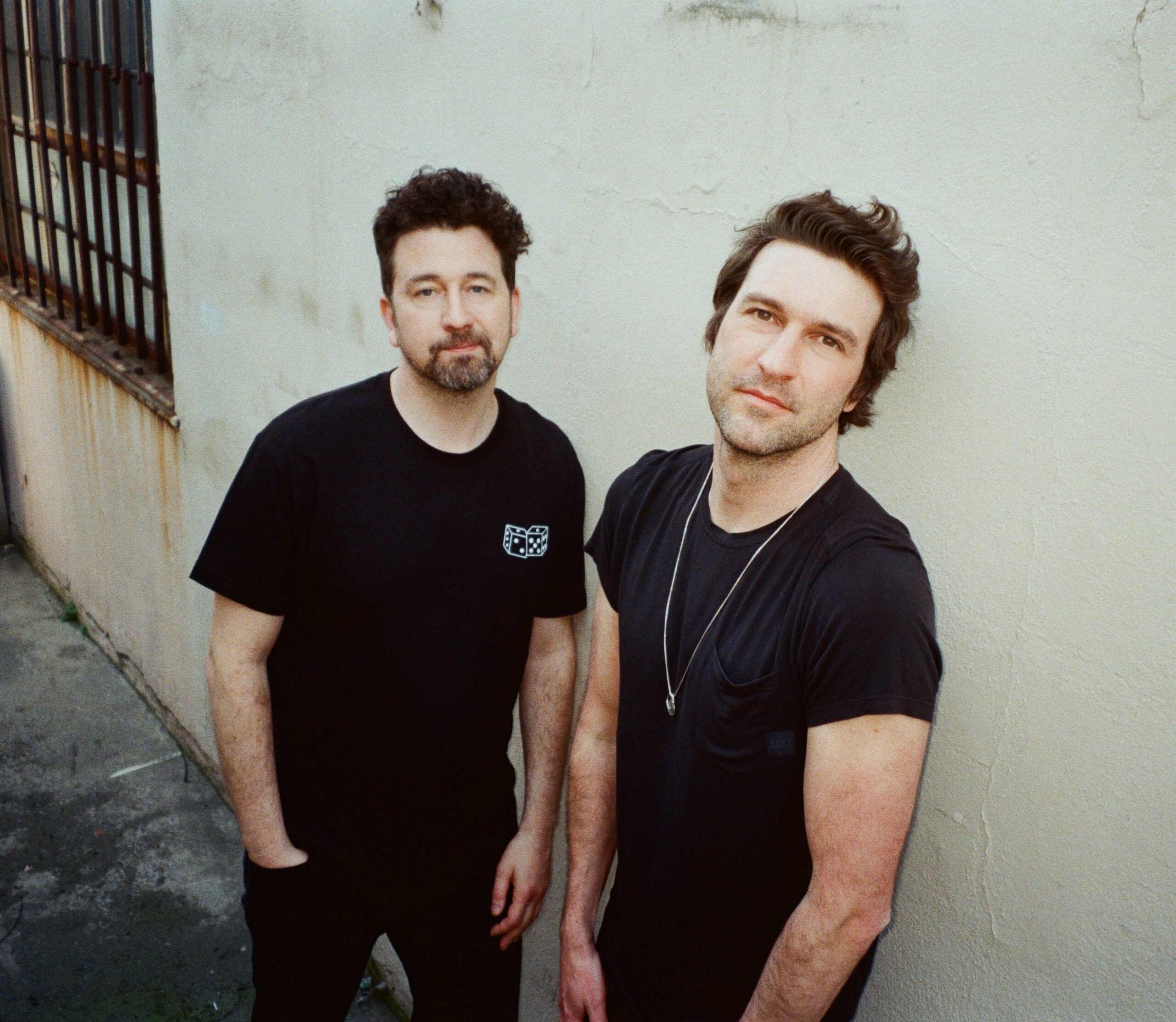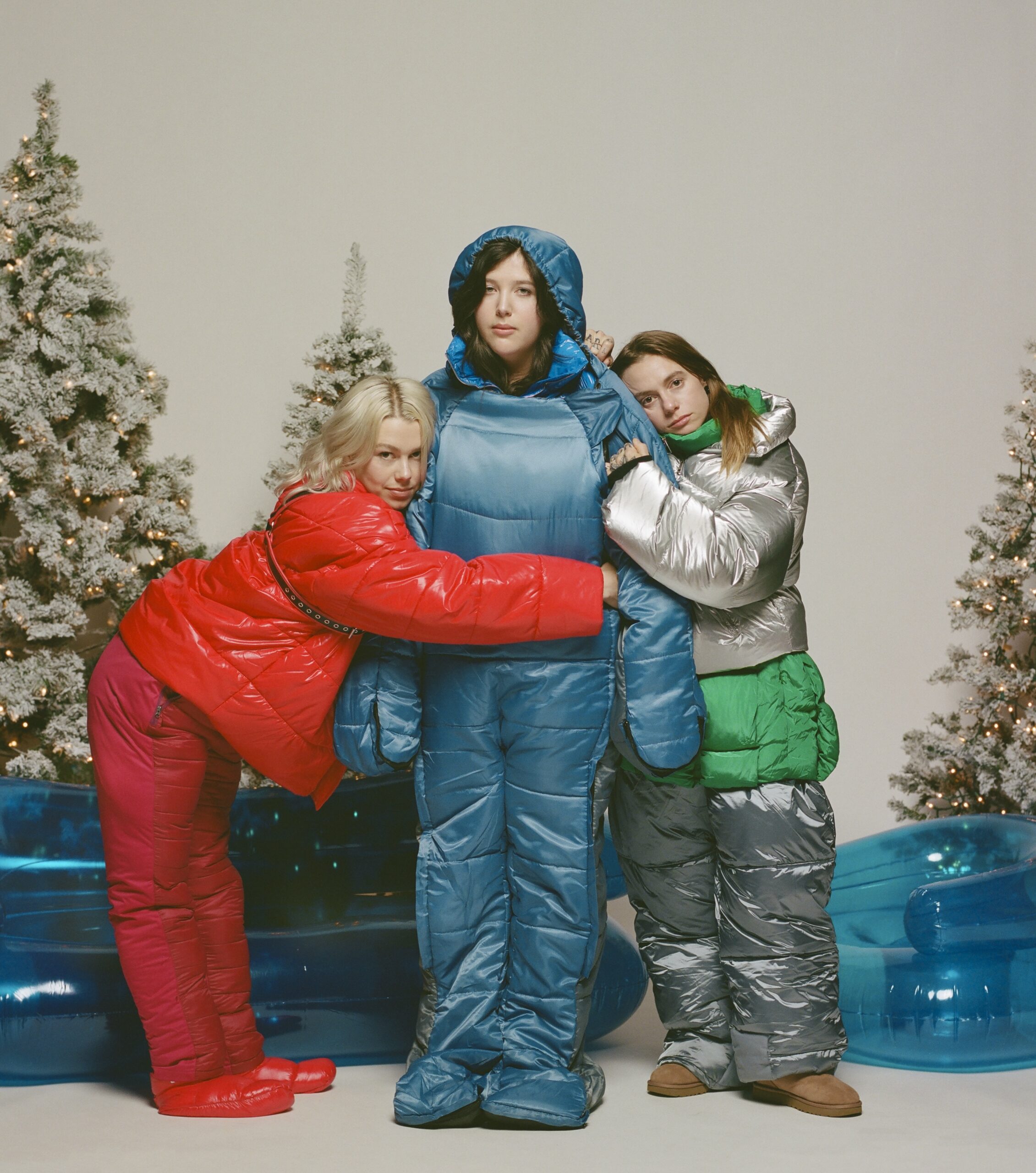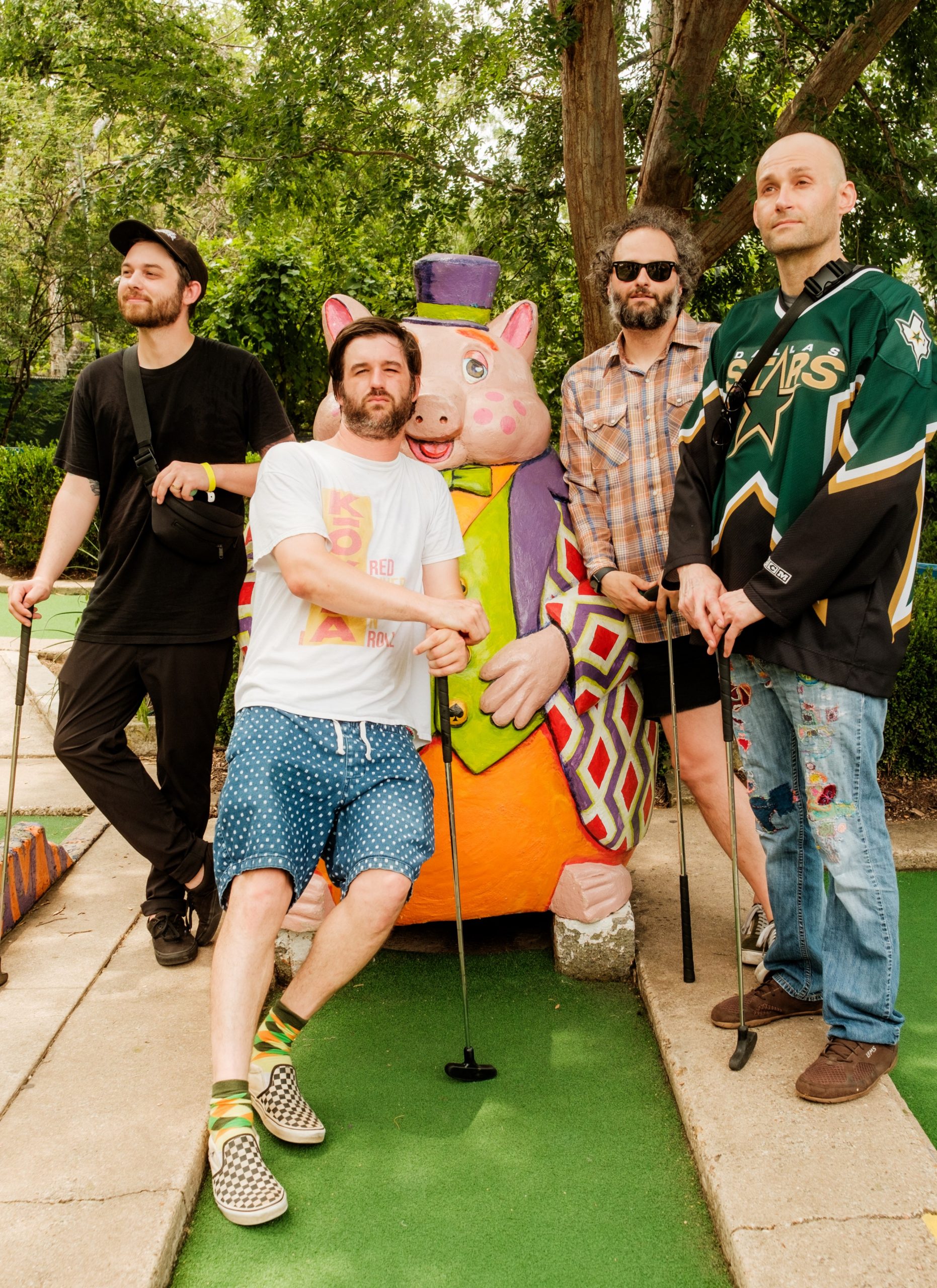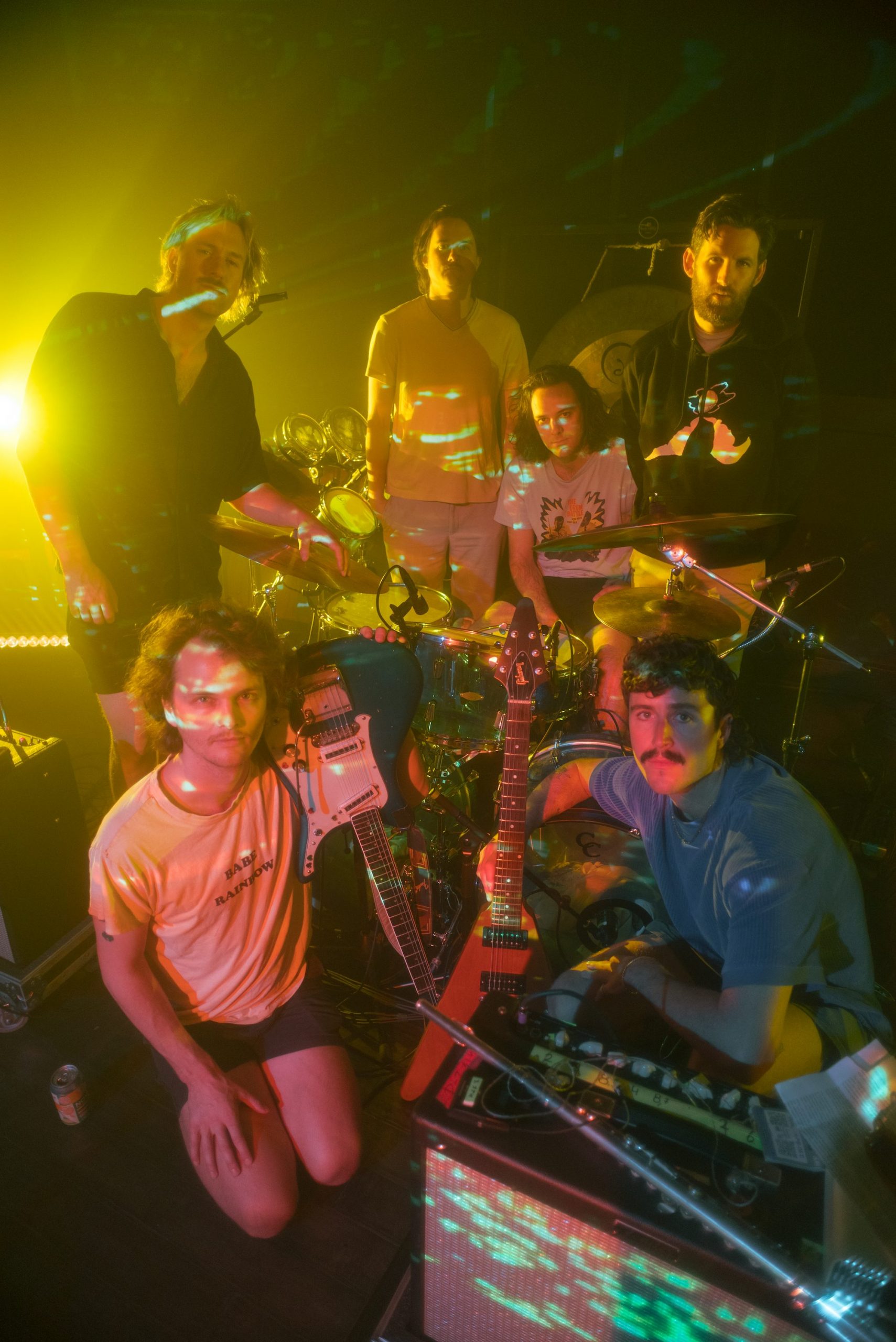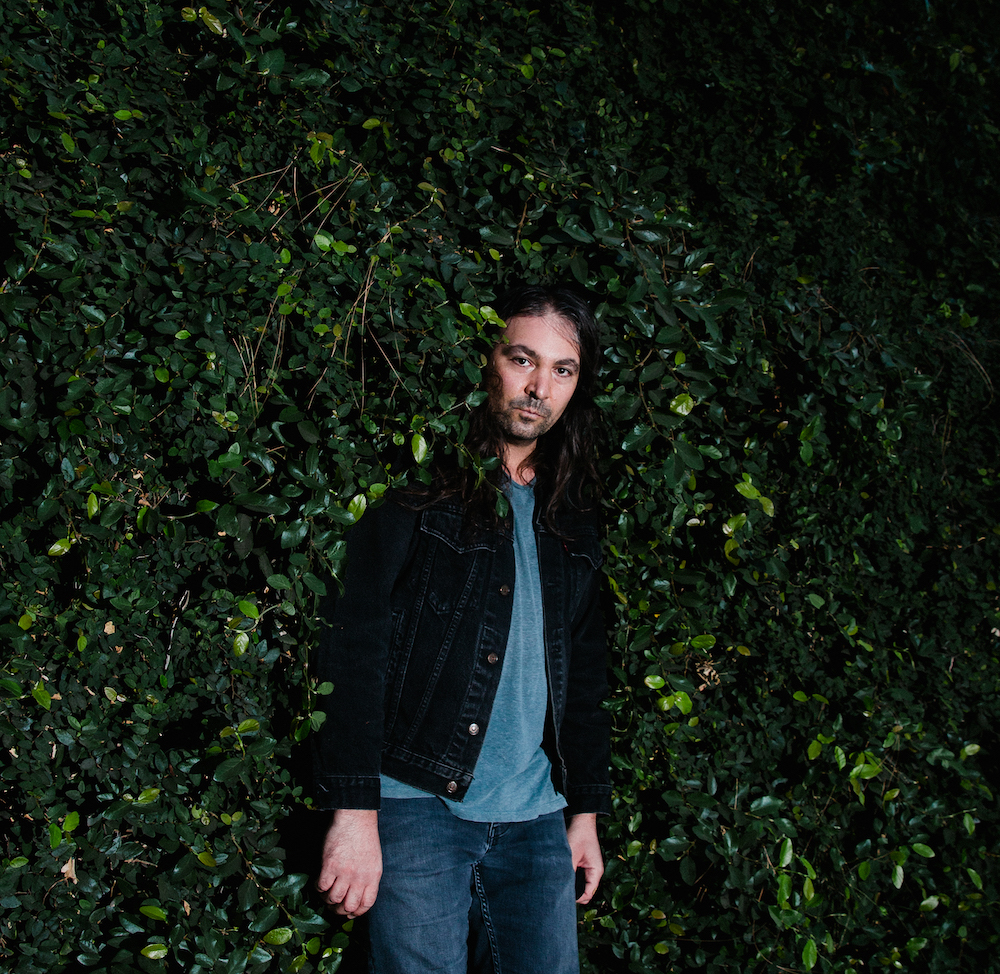There are a lot of things happening in Reykjavik tonight. This is Iceland Airwaves, after all, one of those festivals where there's an endless supply of bands playing various bars and venues, thronged by journalists and musicians converging from a whole bunch of different countries. Apparently, tonight -- Saturday, the festival's penultimate night -- the Northern Lights are faintly visible if you walk just two blocks away and hang out by the harbor. On that same harbor, in Harpa -- a big convention center of sci-fi black glass paradoxically set against the water and mountains that hint at Iceland's Middle-Earth countryside off in the distance -- the Knife are about to play what is being billed as their final show, making this feel like the climactic moment of the week.
Meanwhile, Future Islands are about to play at the Reykjavik Art Museum. In any year before 2014, Future Islands might have gotten lost in the shuffle here. But the Future Islands situation of 2014 is quite a bit different than the Future Islands situation of any other year. This time around, the Baltimore (by way of Greenville, North Carolina) band is one of the absolute centers of orbit, if the ludicrously long line of festival attendees snaking outside the Museum are any evidence, especially considering their willingness to stand right in the crosshairs of the particularly vicious wind coming in off the harbor. (The wetness of Reykjavik's cold is what you might call "bone-chilling," but most times it feels more accurate to assume it's dropped millions of microscopic ice cubes into your blood stream each time you inhale.)
It's a testament to the year Future Islands have had that they're able to go toe-to-toe with things like the Knife's last show ever and a chance to see the Aurora Borealis. After forming in 2006 and releasing three albums prior to this year's Singles, Future Islands had garnered a committed, but modest following, and enthusiastic, though limited, critical attention. From a media/industry standpoint, they were the breakout act at his year's SXSW. Just over a week before SXSW, the band had its first real TV appearance on The Late Show With David Letterman and, man, they made it count. They played "Seasons (Waiting On You)," the song that kicks off Singles, and while Gerrit Welmers and William Cashion stood stoically behind their synths and bass, respectively, frontman Samuel T. Herring gave the sort of performance that became an instant classic in the pantheon of late-night music performances. Who the hell was this burly dude in high-waisted dress pants, with eccentric dance moves and receding hair, alternating between primal chest thumps and sky-searching gazes with arms aloft, periodically dropping metal growls all over a swelling, dramatically emotive synth-pop song? "I'll take all of that you got!" Letterman giddily said at the end of the performance, which he joked about later in the week, compelling the internet to turn a gif of Herring dancing into a meme. Future Islands went from underground act to viral, just like that.
[videoembed size="full_width" alignment="center"][/videoembed]
Looking at the band's pre-show ritual today, you wouldn't guess they've picked up on the fact that things have changed. Cashion casually walks out the back door of the venue and stretches on the street, while Welmers paces around the dressing room with headphones on. Surrounded by discarded Kit Kat wrappers, Doritos bags, 1970s lamps, and empty Icelandic water bottles, Herring sits at a wooden table that looks like it's seen some things, meditatively rolling a cigarette. At some point, his girlfriend walks in and sits next to him on the couch. She looks younger than him, though it's hard to say considering Herring appears closer to 40 than his actual 30. Yeah, there's that oft-remarked-upon receding hairline and short, thick build, but he's one of those guys who just comes across as somehow ageless, from another era, whether because of the grizzled hum of his speaking voice or because of the way his grayish eyes glint from a face that possesses a kind of old-school American charm. (None of that's intended as a jab; in a later conversation, Herring and I commiserate about how people always assume we're ten years older than we are.) Surreptitiously, his girlfriend says, "I think I might go see the Knife..." With his arm around her, he says she should definitely go see the Knife, that that's where he'd be if he didn't have to play. Then, around five minutes after I've met him, he looks at me with that intensely friendly gaze and says, "If I were you, I'd leave right now and go see the Knife."
That's not what I do. Iceland Airwaves is the first of three times I'll see Future Islands within a two-week span. Since it was that one representation of their live performance that has been a major element in Future Islands' heightened profile this year, here's what you need to know about Future Islands live: Believe the hype. While their ascent might have seemed sudden if you weren't paying attention, Future Islands have fought for every inch of ground they've gained, touring absolutely relentlessly since they started the band. (They keep meticulous count of just how many shows they've played to date; they count around 160 this year alone, and around 850 total. Their 1000th show will hit sometime next summer, and Cashion suggests they're planning "something big" for it but declines to say anything specific just yet. Meanwhile, their new label 4AD, in what strikes me as an uncommon move for a label with a newly breakout band, has implored them to ease up on the touring, lest they burn themselves out.) So, it makes sense that there's an earnest sense of effort in Future Islands' performances: a constant and well-calibrated assault of danceable hooks, Herring's unwavering commitment to converting every last person in the crowd. What you saw on Letterman is just a hint of it.
At the Reykjavik Art Museum, the stage is set up at the end of a long, narrow room that is probably simply a foyer when Airwaves isn't happening. Between the high ceilings, concrete floor, copious amounts of metal painted white, and big garage doors backstage, it has the feeling of a hangar. By the time Future Islands come on, the place is packed, and people go nuts when, during the second song, Herring's now-trademark moves are on full display. Which brings me back to that note of Letterman being just a hint of a Future Islands show: People aren't just losing their shit to Singles jams like "Seasons" or "A Dream Of You And Me," but also to older stuff like "Balance" (from 2011's On The Water) or "Long Flight" and "Walking Through That Door" (from 2010's In Evening Air). But more importantly, if you've only seen that Letterman clip, you're not seeing the extent of Herring's performance as a frontman. Chest thumps escalate to Herring full-on punching himself in the face. That low, head-bobbing dance from the "Seasons" meme recurs, but also expands into jumps and, especially in the intro to "Doves," gyrations and Herring popping his ass out into the air. As intense as his gaze can be in conversation, Herring onstage is a whole different thing. He'll lock onto people in the first few rows, engage them, and then as if refilled from this small scale exchange, sweep these wild-eyed looks out over the crowd, and it really does feel like some transmission of energy from person to Herring to all the people. In moments of relative peace or in the comedown from some rage or euphoria, like at the end of "A Song For Our Grandfathers," he'll grow more reflective, casting one arm up into the light and looking out past all of it. Cashion and Welmers and touring drummer Mike Lowry all hold down the slinky rhythms along the way, allowing Herring to do his thing, to ruthlessly work the room. This is all to say: He's the consummate frontman, overflowing with idiosyncratic persona and behavior that's all too rare in most of the indie rock world.
This kind of investment can do some damage to a person, at least when you're investing 160 nights out of the year. After the band finishes its set, Herring's standing outside, having ditched his stage clothes for skinny jeans, a large coat, and a knit hat that let him blend in a bit more with festivalgoers but also -- again, that American-style face -- kind of make him look like a dockworker from some classic '50s movie. He explains his recent throat problems to me, wryly knowing as he does so, considering he's telling me these things between inhaling from another self-rolled cigarette. Back in the spring, Herring started experiencing intense pain for about four or five weeks. One doctor told him his voicebox was swollen shut, another told him he had abnormal growths; it turns out he has a condition called Reinke's edema.
"There's four causes," he explains. "Acid reflux, smoking, talking too much or overuse of the vocal cords, and then chronic misuse of the vocal cords ... which is how I sing," he says, cracking a mischievous grin in reference to those inhuman growls he drops into from time to time. "So, basically, I was four for four." I had been warned before meeting the band that Herring might not be able to talk at all due to the condition, but tonight he's feeling a bit better; all the grit in his voice sounds like character, not damage. Still, the thing about a condition like Reinke's edema is it can be hard to kick in Herring's line of work. "I was having trouble vocalizing," he says. "If I'm not hitting [a note], I growl more to compensate for that, or to reach an emotional peak otherwise, since I can't hit the note." Aside from quitting smoking or trying to eat healthier on the road, the only way for Herring to get the growths to go away is a period of vocal rest, something that doesn't seem to be coming too soon with that whole relentless touring thing. "It's just the nonstop part of it," he says, for a moment letting the charm dwindle and betraying some glimmer of matter-of-fact frustration. "You're hurt, you're tired, so you party and drink more to get over that. You hurt your voice, so you have to sing even harder to get it to come out, and then you're hurting it more." Mostly, though, things are way better now than they were a few months ago, and Herring still sardonically grins through most of the conversation; his eyes still shine. It doesn't matter if his instrument's a bit mangled from this year. This isn't the time to slow down.
A little more than a week later, I'm standing outside Death By Audio in Williamsburg. Admirably, Brooklyn tonight is more violently cold than Reykjavik last week, which is really impressive considering Iceland is near, you know, the Arctic Circle. Future Islands are one of the unannounced headliners in a run of DBA's final, go-out-with-a-bang set of shows. Anyone who's making it into the space tonight is probably already inside. A few women walk past me and ask if I know who's headlining tonight and if it's worth ten or fifteen dollars. I kind of mumble "Future Islands," because I'm not sure if I'm supposed to say anything at this point or if it really matters. "Oh, Future Islands! I know them!" says one of them. "That's definitely worth ten dollars."
Future Islands have played DBA once a year since 2007, basically since almost as long as they've been around as Future Islands. (Having formed in 2006, the band first played the city -- at a venue called Goodbye Blue Monday -- in 2007, and a show at DBA with their friend Dan Deacon followed that same year.) The recurring DBA shows were somewhat happenstance -- for the first several years of Future Islands, Cashion booked all of their tours, first starting with DIY spaces around the country where Deacon had given him contacts. "For a DIY space, DBA always had really good sound compared to some of the other places," Cashion explains. "We're a band that really depends on a good PA," he continues, alluding to that difference between the big synth sound of Future Islands and the scuzzy punk that might otherwise dominate a place like DBA.
For a while there, a circuit of DIY venues was where Future Islands felt more comfortable, and you can still see it in the way Cashion casually leans against the doorjamb separating the main room of DBA from a hallway, amongst the crowd and watching the opener, blending in easily with his long hair and mustache. "It was kind of the world we knew," Cashion says. "You don't have to impress anybody, or kiss anybody's ass to play those rooms." For many years -- really, in a lot of cases, up until this year even -- the band handled most of its affairs on its own. As the years went on, they eventually got a merch person, booking agent, tour managers, eventually started bringing light and sound people on the road. For a while, though, they really handled this all by themselves; Cashion would even create lighting schemes that he would key through a stompbox onstage while he was playing bass. "It took us a long time to start playing real clubs and for a long time we were kind of against it," he continues. "We were more comfortable playing a warehouse or a house party or an art gallery or something." This, on some level, is still part of their ethos -- the band put its own money up to record Singles, did it their way, and signed with 4AD after the fact. They marvel at the fact that they recently did a bus tour, when earlier this year they were still crashing on people's floors after concerts.
[videoembed size="full_width" alignment="center"][/videoembed]
DBA's gone all out for its wake. There are art installations all over the venue, people getting high in a narrow hallway space otherwise populated by arcade games. Tim Harrington from Les Savy Fav towers over everyone and is hanging around randomly after sitting in with one of the openers for a set-closing cover of "New York, I Love You But You're Bringing Me Down." Herring and Lowry also wander around freely through it all. Herring, in particular, seems gregarious with his time -- the one rough spot in Reykjavik occurred when he was frustrated that an Icelandic security guard wouldn't let his friends backstage with him, and at DBA he uncomfortably but patiently fields some kind of drama from a woman it seems he used to know. Since Iceland, they've had a week off in Baltimore and his voice is much clearer. "I was kind of tour-sick in Iceland," he explains, before going on to wonder how he'll feel tonight. "It's weird, you can be on a three week tour and go home and not sing for a week, and you have to relearn [everything]. Everything heals."
Future Islands aren't long for rooms the size of DBA and, really, there's probably already a bit of nostalgia creeping into the experience of seeing them in this kind of space as 2014 wanes. When Herring gets onstage, he tells a story of an old gig there, probably in the band's earliest days, before DBA had a stage and when it felt like a hundred and twenty degrees inside and there were people crowd-surfing through the doors on either side of the room. The year these guys have had has to have been a rush, but you can hear a bit of wistfulness in how he talks about it all, before he winds up to what he really wants to say: "We've been playing too many cushy fucking shows this year, man. This is the real shit."
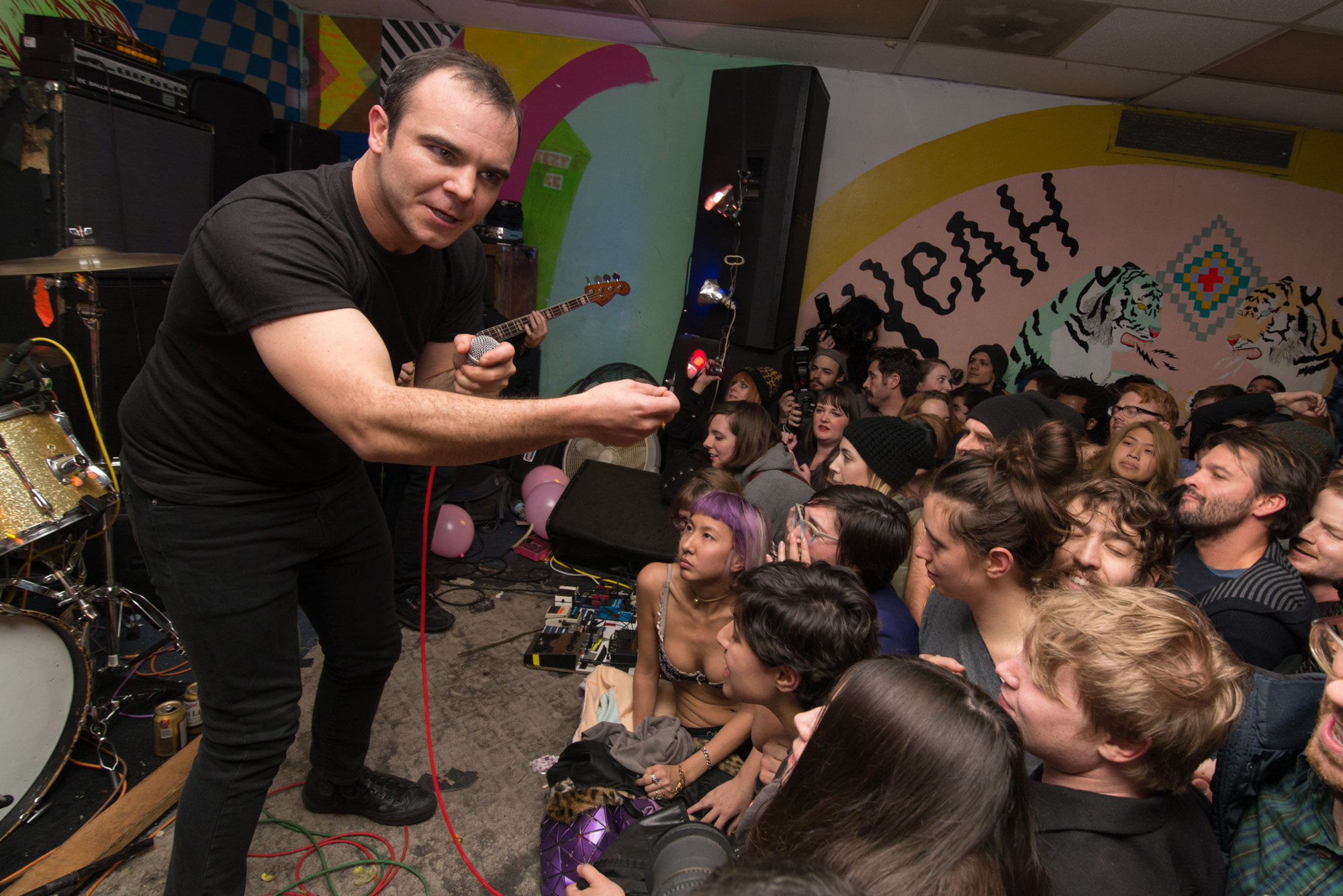
At least, DBA is one version of the real shit. Two days after DBA, we're sitting poolside at the Roosevelt Hotel on Hollywood Boulevard in Los Angeles, which is not exactly one's idea of the real shit at all. There's something that doesn't quite compute, talking to a band like Future Islands -- your prototypically earnest, down-to-earth dudes -- around the cartoon free-for-all of human psychosis that is Hollywood Boulevard. It's somewhat chaotic out on the street right now, with tourists hanging around the Chinese Theater, which is already sectioned off for the Horrible Bosses 2 premiere red carpet. There are all the attendant eccentrics and seediness of Hollywood Boulevard: the endless collection of smoke shops, the people dressed up as Charlie Chaplin or Star Wars characters or Spongebob Squarepants. There's some modicum of tranquility within the walls of the Roosevelt, though, this pool soundtracked by lite-indie fare and framed by the two-story portion of the hotel that looks unchanged from some mythic 1950s memory of LA. Herring's staying in one of these rooms, but he's yet to discern whether his room is the one supposedly haunted by Marilyn Monroe's ghost. Mutated Americana aside, Future Islands are playing a sold-out show at the Wiltern in Koreatown, an installment in Red Bull Sound Select's 30 Days In L.A. series, in which RBSS curates a different show each night of November featuring their own RBSS artists alongside names like Run The Jewels and Tame Impala and, tonight, Future Islands. The Wiltern is the largest venue they've yet played in LA, and that's a whole different definition of the real shit. As Herring will later note onstage: The last time they played LA, they played to 350 people. Tonight, it's 2,000.
Having just met with Wayne White for a Future Islands video that'll see release next year, the band is primarily looking forward today. That's been the case for most of the year. 2014 has been a year with a lot of change, the sort that can be overwhelming for a band, but they've sort of kept their heads down and kept doing their thing. "We're still figuring out the reach that [Letterman] got," Cashion explains. "We've been so busy on the road this whole year, there's been very little time to sit back and reflect. That's our whole thing. We want to keep working the way we've always been working. It's not really our style to sit back and be like, 'We did that.'" Approaching Letterman, there wasn't even necessarily the climactic swell one might expect; the band had already been told they had a shot at getting on Letterman when On The Water was coming out, and since it didn't happen, they expected this year to be the same. "Everyone at 4AD was like, 'You're going to get this. Are you ready for that opportunity?'" Herring says. "And we're like, 'Yeah, sure, we've been waiting two and a half years for that opportunity.' We were just excited to share that with our fans and our friends and our family."
While the Letterman performance might have kick-started Future Islands' success this year, there are still elements that make them slightly uncomfortable about it. "[I] definitely didn't follow the meme," Herring says, looking down and poking at his kale salad. "[I was] just hoping it would go away. I never want to overshadow anything." That's the thing about having a frontman as dynamic as Herring, and having the particular reasons he's so dynamic be so, well, eccentric compared to what usually graces Letterman's or SNL's stages. While the video getting so big pleased the band, Herring had misgivings about how the meme isolated him and his dance moves, sans "Seasons." "It's just a moving image, and it's supposed to make people laugh, which bothers me," he says. "That's not what it's about for me. I guess it's good, it makes people happy. Of course, I do what I do to bring people in and to hopefully blow people's minds, but like I said, it's not about just me. It's our creation. I'm nothing without these guys."

The reasoning here is that the fixation on Herring -- inevitable though it may have been -- was counter to the whole reason he and Cashion and Welmers formed Future Islands after dissolving their former outfit, Art Lord & The Self-Portraits. Their first band was purposefully performative, the idea being that Herring played the "Art Lord," a musician who couldn't find any musicians good enough to play his songs, so he created a bunch of "Self-Portraits," to back him up -- i.e., Cashion and Welmers and the other members of the band. Understandably, that could lead to some misunderstandings. "We wanted to be more a communal thing. We wanted people to take us seriously," Herring says. "It's funny, because we used to say that we didn't ever want to be just the normal band. We wanted to have this history, this mythology about what we did. With Future Islands, we just wanted to be a normal band." Adds Cashion, "We took a joke too far." (Ironically, long before Future Islands took Letterman by storm, they had their first TV appearance as Art Lord, when their live shows would play on public access in Greenville late at night. "I think they still play it," Cashion jokes.)
The one thing that must still be gratifying about the Letterman aftermath, though, is the fact that the band always knew it had something with "Seasons." "We were trying to write almost every day at that point, building songs for what would become Singles," Herring remembers. He recorded Welmers and Cashion jamming "Seasons" out, took it home, and wrote the words in thirty minutes. "I recorded a demo and sent it back to the guys the same day and I was like, 'This is the best song we ever wrote,'" Herring says. "They kinda thought I was crazy. I was like, 'This is it. I was really hit by it. This is really powerful.'" He wasn't wrong, and people noticed. It's one of the best singles of 2014. "I definitely thought that was going to be a big song," Herring recalls.
With that confidence underlying "Seasons," and other songs -- Herring also made his "best song we've ever written" proclamation when they finished "A Dream Of You And Me" -- it'd be easy to read the title of Singles as having a cheeky quality to it. Like, "Here we are making some idea of pop music in relative obscurity and, boom, here are the hits." Or a kind of self-aware approach, more along the lines of "We've been slugging this out, and this time we really go for it. Take no prisoners. Singles." The former, on some level, had some reality to it: They all talk about the fact that they make what is, in their minds, essentially pop music, though of course not the kind of pop music you hear on the radio. "When we were writing for Singles, it wasn't like, 'Let's try to write bangers,'" Herring says. "We just wrote the way we always have."
While it would be kind of awesome if Singles had always been intended as some go-for-broke attempt at a long-gestating breakthrough, these guys have been inside the Future Islands thing for years, and don't see it that way. "A lot of people think that this year we just became this thing, or this is the first time we tasted success," Herring says. "But we feel we've been successful. We were able to support ourselves completely off of our music. We live comfortable lives." Somewhere in the midst of the kale salad and a succession of those self-rolled cigarettes, Herring pulls a notebook out, where he writes all his loose ideas on the road. There's a page in there littered with working titles for what eventually became Singles. Most of them, like the preceding three albums, had some sort of natural imagery to them: Making Our Way Into Night, Before Blue Morning, Bluish-Green Field, Those Long Roads. Once More For Luck was the one Herring really liked, though, and there's still something kinda cosmic about an album once called that, later called Singles, that did wind up breaking the band in a much larger sense than those past successes.
The thing about Singles or "Seasons" not being planned, though, is that -- now that Future Islands' breakout year is coming to its conclusion -- they have the kind of indelibility that would seem to demand what's occurred. "All of the media outlets want to be the one to discover the next thing. They're not looking at bands like us," Herring says. "We're kind of past it. We'll be on the periphery and we'll get coverage." But nobody called it this year. Nobody said, "This is Future Islands' year." You can't predict things like David Letterman trying to turn a performance into a meme. These are the most organic kinds of breakthroughs, the sort that defy narratives and just grab your attention because they don't give you another option. "We just took it," Herring says.
For Cashion, after years of booking their own tours and loosely entertaining ideas too ambitious for the moment, the exciting thing is how much this opens everything up. "This year, I've had this moment. All of a sudden, overnight. It's like, 'What do you want to do here?'" he says. "Now's the time to do those things. It's a cool place to be. That's overwhelming, because we can take it in so many different directions."
The show at the Wiltern is the final victory lap in a year of victory laps, for a band who doesn't believe in that sort of thinking and probably had stopped expecting this particular door was going to be open to them. It's a fitting climax to my time with the band: The show in LA is by far the biggest, grandest production of the three, filled with by the far the most fervent group of Future Islands fans. Herring walks out, much like he did at DBA, but this time under a massive array of lights and to a sold-out theater. He says something about how it's been a crazy year, and this is the big conclusion to that year. Then he says, "A Song For Our Grandfathers" is a song about "burned out tobacco fields," one small callback to Carolina, and to the little incremental steps through Art Lord and Future Islands and Greenville and Baltimore and who knows how many little DIY spaces that eventually led them to this, 2014, the Wiltern and everything that came before it.
I'm half paying attention at this point, though. When they walk onstage, I'm overwhelmed one more time, even though I already know how this show goes pretty well by now. In that moment, I'm struck by how this all came together for the band in this moment -- how they took it, this time around -- and something Herring had said earlier today, at the pool:
"'What are you going to do?' 'How are you going to handle this?' 'How are you going to do it?' I never even thought about it. To me, my opinion of this band and the way we do things is, just give us the stage. Give us a stage, we'll do our thing. That's all we need. We just need the opportunity. I never thought about like, 'Well, what are we going to do?' In my mind, we had what we needed to succeed, we just needed someone to give us a chance."

